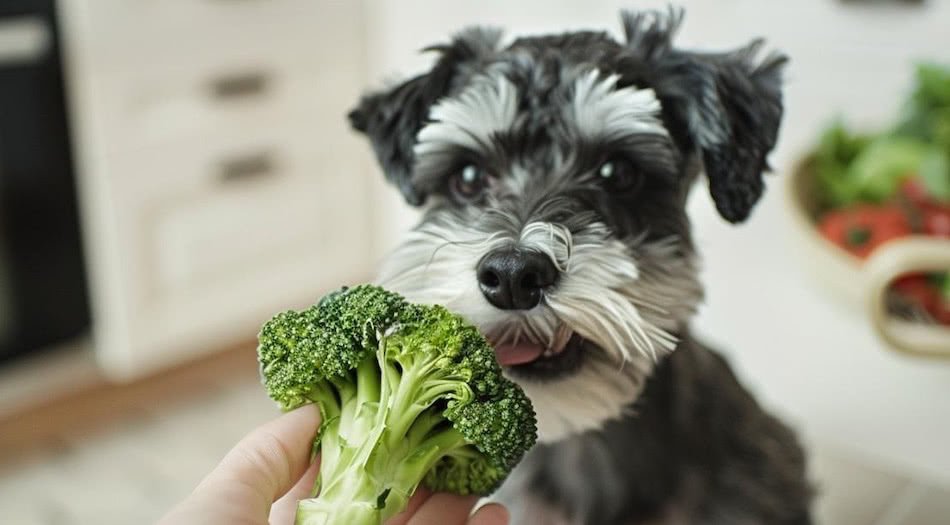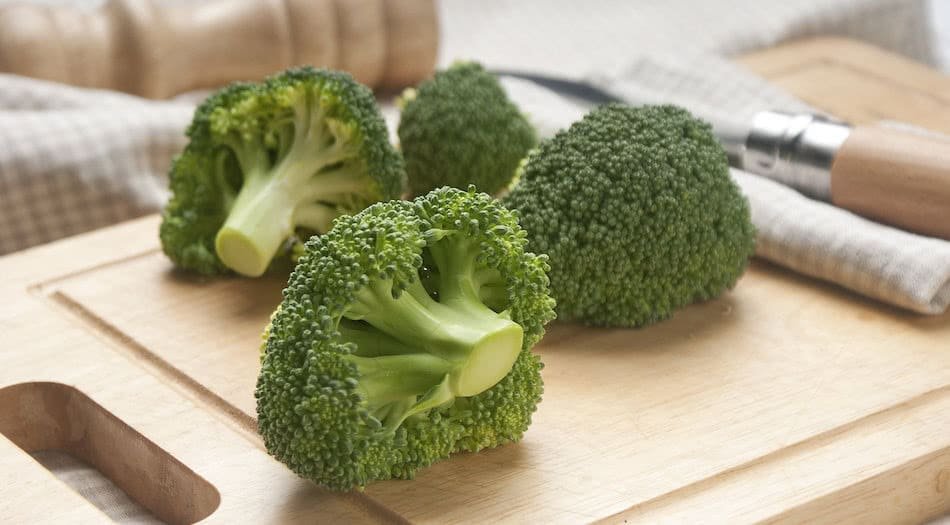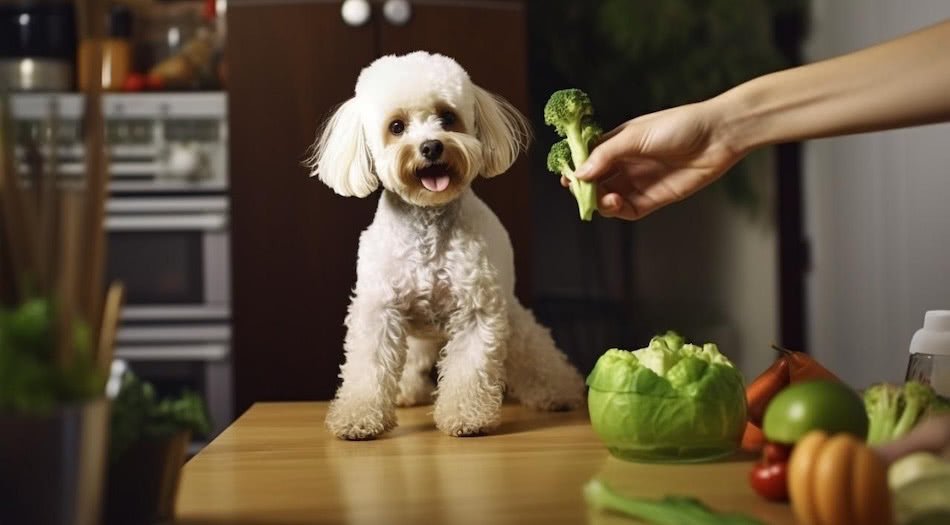Broccoli is a powerhouse vegetable, packed with nutrients and often featured in health-conscious meals. As a pet owner, you might wonder, can dogs eat broccoli? The answer is yes, but there are some considerations to keep in mind before sharing this green veggie with your furry friend. Let’s explore the benefits and potential concerns.

Before introducing any new foods to your dog’s diet, always consult your vet. Individual dogs may have different intolerances, dietary needs, and health considerations. This article is not a substitute for professional veterinary advice.
Benefits of Feeding Dogs Broccoli
Broccoli provides essential nutrients that can benefit dogs.
- Vitamin C
- Vitamin K
- Potassium
- Magnesium
- Antioxidants
- Fiber
- Phtytoniutrients
- Low calorie
Broccoli contains high levels of vitamins. Vitamin C is an important antioxidant that supports the immune system. Vitamin K contributes to bone health by ensuring proper calcium absorption.
Minerals like potassium and magnesium found in broccoli support heart health. A healthy heart ensures a long and active life for dogs.
The antioxidants present may help in reducing inflammation and fighting off free radicals.
Being rich in fiber, it aids in digestive health. Fiber ensures smooth bowel movements and prevents constipation.
Phytonutrients found in broccoli help detoxify the body. These natural compounds may also have anti-inflammatory properties. Reducing inflammation may lead to better joint and overall health.
Broccoli is low in calories, so it’s a good option for dogs that need to lose weight or maintain a healthy weight. Low-calorie foods help prevent obesity-related conditions.
Included in a balanced diet, broccoli can enhance a dog’s overall well-being. Always serve in moderation to avoid digestive issues.
Risks of Feeding Dogs Broccoli
Feeding dogs broccoli can present several risks.
- Isothiocyanate compounds
- Oxalates
- Chocking hazard
- Too much fiber
- Rare allergic symptoms
Broccoli is a cruciferous vegetable and contains isothiocyanates, which are plant compounds that have potential health benefits like cancer prevention, anti-inflammatory effects, and detoxification support but they can also cause gastrointestinal irritation in dogs. Larger amounts may lead to severe digestive issues such as nausea, gas, bloating, and diarrhea.
Oxalates in broccoli can bind to minerals such as calcium, forming crystals which can contribute to kidney stones and urinary issues. Dogs with a history of renal problems should steer clear of broccoli or consume it in minimal amounts under veterinary guidance.
Choking hazards are another concern. Broccoli stems can be tough and challenging for dogs to chew properly, increasing the risk of choking or esophageal obstruction.
Fiber is good but too much fiber may cause loose stools and abdominal discomfort. Monitoring the quantity given is important as broccoli is high in fiber, to prevent any issues.
Although rare, some dogs may be allergic or sensitive to broccoli, leading to symptoms such as itching, swelling, or respiratory problems. It’s important to watch for any adverse reactions when introducing broccoli to a dog’s diet.
Consulting with a veterinarian before introducing broccoli or any new food into a dog’s diet ensures safety and appropriateness for the individual dog’s health and dietary needs.

What Parts of Broccoli Can Dogs Eat?
Broccoli is a healthy addition to a dog’s diet when given in moderation. The parts of broccoli that are safe for dogs include the florets and the stems. Both parts contain valuable nutrients, but each has different considerations regarding preparation and serving size.
Broccoli Florets
Broccoli florets are rich in vitamins and minerals such as Vitamin C, Vitamin K, and fiber. However, florets also contain isothiocyanates, which may cause gastric irritation in dogs if consumed in large amounts. It’s advisable to keep the portion size small—less than 10% of the dog’s daily intake.
Broccoli Stems
The stems are generally considered safer for dogs to eat. They contain fewer isothiocyanates compared to the florets, making them less likely to cause stomach upset. Stems are also high in fiber, promoting digestive health. It’s important to chop them into small pieces to avoid choking.
Preparation Methods
Raw
Raw broccoli is safe but wash it thoroughly. Small pieces facilitate easier digestion and are better to avoid choking hazard.
Steamed or Boiled
Steaming or boiling softens the broccoli, making it easier to chew and digest. Do not add any seasoning or oil.
Baked
Baking is another option. Ensure it is plain with no added ingredients that could harm dogs.
Mixing broccoli with other dog-friendly vegetables can offer a balanced treat. Suitable options include carrots, peas, and green beans. Always consult a veterinarian before introducing new foods to ensure it fits the dog’s nutritional needs.
Can Dogs Be Allergic to Broccoli?
While broccoli is generally considered safe for dogs, some dogs can be allergic to it. Allergic reactions in dogs occur when the immune system mistakenly identifies certain proteins in broccoli as harmful. This can lead to various symptoms.
Common signs of a broccoli allergy in dogs include
- itching
- skin rashes
- vomiting
- diarrhea
In more severe cases, a dog may experience difficulty breathing, swelling, or anaphylaxis, which requires immediate veterinary attention.
When introducing broccoli to a dog’s diet, it is essential to monitor them closely for any adverse reactions. Start with a small portion and observe any changes in behavior or health. If any symptoms arise, consult a veterinarian promptly.
Veterinarians can perform allergy tests to determine if broccoli is the cause of the allergic reaction. These tests involve either blood tests or a skin test to identify the specific allergens affecting the dog. Based on the results, the veterinarian may recommend an elimination diet to pinpoint the exact cause of the allergy.
Although broccoli allergies are not common in dogs, it is always better to be cautious.

How Much Broccoli Can I Give My Dog?
Dogs can eat broccoli, but moderation is key. The right amount depends on the dog’s size, age, and overall health. Too much broccoli can cause digestive issues and upset stomachs due to the isothiocyanates it contains.
- For small dogs, a few small florets once or twice a week suffice.
- For medium-sized dogs, one to two larger florets per week is appropriate.
- Large dogs can handle more, but still, limit it to no more than 10% of their total diet.
When introducing broccoli for the first time, it is important to monitor for any adverse reactions. Start with a small amount and observe for signs of gas or gastrointestinal discomfort.
How to Feed Your Dog Broccoli
Feeding your dog broccoli can be a healthy addition to their diet if done correctly.
Broccoli needs to be prepared correctly before feeding it to your dog. Wash thoroughly to remove any pesticides. Cooking methods like steaming or boiling are preferred as they make the vegetable easier to digest without losing too many nutrients.
It should be given in moderate amounts, regardless of its form.
When introducing broccoli, start with small pieces to see if the dog likes it and can digest it without issues.
It’s best to serve broccoli as an occasional treat and not as a staple food.
FAQs
Common questions about feeding dogs broccoli can help owners make informed decisions about adding it to their dog’s diet.
Can Dogs Eat Raw Broccoli?
Dogs can eat raw broccoli, but it should be given in small quantities. Raw broccoli can be tough on a dog’s digestive system due to its fibrous nature. Always cut the broccoli into bite-sized pieces to prevent choking hazards. Monitoring your dog after they consume raw broccoli to ensure they don’t have any adverse reactions.
Can Dogs Eat Cooked Broccoli?
Cooked broccoli is easier for dogs to digest compared to raw broccoli. Steaming or boiling the broccoli with no added seasonings or oils is best. Avoid using salt, butter, or garlic, as these can be harmful to dogs. Cooking broccoli softens its texture, reducing the risk of choking and gastrointestinal issues.
Can Dogs Eat Broccoli Stems?
Dogs can eat broccoli stems, but they can be quite tough, so it’s important to chop them into small, manageable pieces. As with florets, stems should be given in moderation due to their high fiber content, which can be difficult for some dogs to digest easily.
Does Broccoli Make Dogs Gassy?
Broccoli can make dogs gassy. It contains isothiocyanate, which in large quantities can cause gastric irritation in dogs. Bloating and gas are common side effects if a dog consumes too much broccoli. To minimize gassiness, offer broccoli in small amounts.
Can Broccoli Make Dogs Sick?
In moderate amounts, broccoli is generally safe for dogs. However, isothiocyanate in broccoli can be toxic if consumed in very large quantities causing nausea, vomiting, and diarrhea. Oxalates in broccoli can contribute to kidney stones so dogs with renal problems should avoid consuming it. Always monitor your dog’s reaction to broccoli and consult your veterinarian if you notice any signs of concern. Or consider offering other fruit and vegetables.
Final Thoughts on Can Dogs Eat Broccoli?
So, the verdict on can dogs eat broccoli? Yes dogs can generally eat broccoli. It can be a healthy addition to a dog’s diet when served in moderation, being rich in vitamins, fiber, and antioxidants. However, there are some precautions as broccoli contains isothiocyanates compounds that can cause gastric irritation in dogs, and oxalates which may be an issue for dogs with renal problems, so they should avoid it. Cooked broccoli is often easier to digest but it’s important to avoid adding any seasoning or oils, as these can be harmful. Given the proper precautions, broccoli can be a beneficial treat for dogs, adding variety and health benefits to your pup’s meals.





